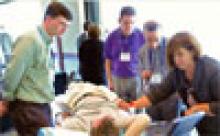Best of the Clinical Tracks
Couldn’t make it to a session you wanted to attend? Missed the meeting entirely?
This at-a-glance wrap-up provides some highlights from several key sessions:
Clinical Tracks
Key session: “The How, When and Why of Comanagement” presented by Eric M. Siegal, MD, regional medical director, Cogent Healthcare, Madison, Wis.
Take-away points: Co-management does not always result in better or more efficient care. Common arguments in favor of having hospitalists involved, such as improved outcomes and leveraging scarce specialist resources, each have a counter-argument that should be carefully considered.
In assuming co-management of orthopedic or neurosurgical patients, Dr. Siegal points out: “We’re managing patients we were never trained to manage. Subspecialties know how to do this type of care. Why step in, learn new skills, and practice them on living patients?”
Dr. Siegal summarized his concerns with some clear caveats: “Be rigorous about defining your co-management responsibilities; admit that some patients don’t need us; concentrate on leveraging your own scarce resources; and recognize that it’s sometimes better for a surgeon to see his or her patient.”
If and when you do assume co-management responsibilities, he advised, ask questions, including “Why are we being asked to participate?” “Will we make a difference?” and “What might we screw up?”
Key session: “Nosocomial Infections and Resistant Organisms” presented by James Pile, MD, FACP, Case Western Reserve University/MetroHealth Medical Center, Cleveland, Ohio
Take-away points: Dr. Pile’s presentation began with the evolving topic of methicillin-resistant Staph aureus (MRSA). He traced the evolution of nosocomial and community-associated strains of MRSA and detailed the ongoing shifts in the distribution of community-associated MRSA (CA-MRSA). Particular attention was given to the ongoing movement of CA-MRSA out of the community and into the hospital setting, the recent emergence of multidrug resistant CA-MRSA on the East and West coasts, and MRSA colonization.
He also touched on the emerging understanding that vancomycin is a less-than-ideal treatment for serious MRSA infections, and outlined the potential utility of alternative agents old and new. He then addressed catheter-related bloodstream infections, including optimal diagnostic methods, evidence-based methods of prevention, and treatment strategies.
He stressed that the still-underutilized therapeutic modality of antibiotic lock therapy clearly appears to increase the likelihood of successfully salvaging infected catheters, and discussed the fact the responsible pathogen helps inform the decision to remove or retain an infected catheter. He closed by pointing out that revised guidelines for the treatment of catheter-related bloodstream infections from the Infectious Diseases Society of America should be released shortly.
Operational Track
Key session: “Designing Compensation and Bonus Plans to Drive Desired Behaviors” presented by Rachel M. George, MD, MBA, Cogent Healthcare, Department of Pediatrics at SUNY Downstate Medical Center, Brooklyn, N.Y.; Winthrop Whitcomb, MD, Mercy Medical Center in Springfield, Mass.; and John Bulger DO, FACOI, FACP, Geisinger Health System in Pennsylvania.
Take-away points: Dr. Whitcomb discussed compensation for community-based hospital medicine programs that reward both an individual’s productivity—based on RVUs, charges or cash—and quality measures met, which will directly improve quality.
Dr. Bolger believes hospitalists at a large academic teaching center should have the ability to affect their compensation; therefore, those who contribute more should be compensated more. His institution uses a base-incentive plan that rewards for core values including teaching, innovation, and quality.
Dr. George of the multistate hospital medicine program Cogent Healthcare discussed her organization’s compensation plan of a base salary plus a bonus of approximately 20% of salary for incentives.

